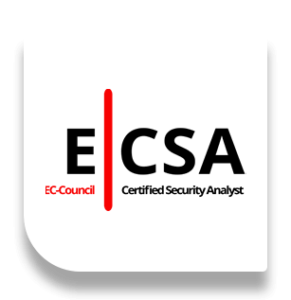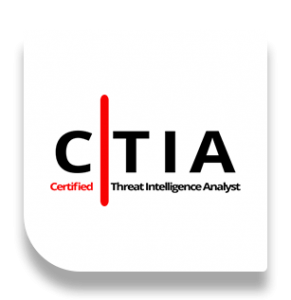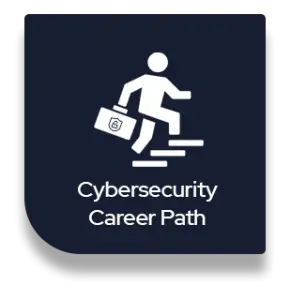The International Council of Electronic Commerce Consultants (EC-Council) is a long-standing professional certification organization for IT Professionals emphasizing cybersecurity. The EC Council’s goal is to support individuals who create and maintain security and IT systems. It is the creator of the Certified Ethical Hacker (C|EH) certification. However, the non-profit group has many more globally acknowledged credentials.
EC-Council flagship certification is the C|EH and is a sought-after certification. So, how do you become a C|EH? Start with the basics: Earn your CompTIA A+ Certification and get a tech support position. Then, after some experience and additional Certification (CompTIA Network+ or Cisco CCNA), move up to a network support or admin role, and then to network engineer after a few years.
Next, or if you are already a few years into your IT career, put some time into earning security certifications (CompTIA Security+, or (ISC)² CISSP) and find an information security position. While you’re there, try to concentrate on penetration testing and get some experience with the tools of the trade. Then work toward the C|EH Certification.
Networking know-how is vital, but make sure that you gain experience in related areas as well. For example, discover and play with Unix/Linux commands and distributions. Make sure you also learn some programming such as C/C++, Python, Ruby on Rails, or Javascript, and spend some time with databases such as SQL.
The Certified Ethical Hacking training course will significantly benefit security officers, auditors, security professionals, site administrators, and anyone concerned about the integrity of the network infrastructure. To be prepared, you’ll want to ensure you have some exposure to the basics of information gathering, attacking computers or servers, wireless attacks, and social engineering. In addition, this Certification forms the building blocks of cybersecurity knowledge.
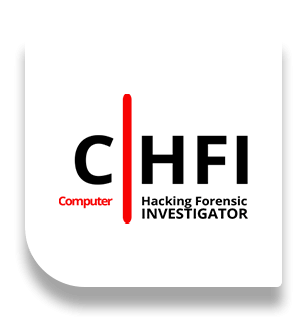 A job with high pay and a specialized skillset offered by a computer hacking investigator needs proper Certification. The computer hacking forensic investigator (C|HFI) certificate confirms your skills in terms of cybersecurity and detection of an intruder’s presence, as well as tracking the criminal back to his home computer and gathering evidence to charge them with the crime.
A job with high pay and a specialized skillset offered by a computer hacking investigator needs proper Certification. The computer hacking forensic investigator (C|HFI) certificate confirms your skills in terms of cybersecurity and detection of an intruder’s presence, as well as tracking the criminal back to his home computer and gathering evidence to charge them with the crime.
The work of a C|HFI requires that highly skilled professionals have excellent and intimate knowledge of cyber security. Candidates must also possess outstanding auditing and reporting skills. In addition, they must have the know-how to detect a security breach and take steps to recover immediately. Finally, a great deal of patience is required to sift through the mountain of information to find evidence of a cybercrime. The ideal candidate to become a C|HFI professional include:
- Those involved in the field of defense and security
- Those familiar with the virtual world and online security issues
- Professionals from the world of banking and insurance
- Professionals with some experience in law and legal aid
- Government officials and IT persons with expertise in dealing with cybercrimes
- Law enforcement personnel
Digital forensics is an integral part of the cybersecurity community. It collects, preserves, analyzes and reports evidence against cybercriminals accused of breaking the law. Forensic experts can follow back to gather evidence that could be useful for the prosecution of these criminals. In addition, forensics, a combination of technology and law, help investigate and maintain data integrity and conduct audits to protect the organization from further attacks. Thus it is an in-demand high-salary profession. A C|HFI certification validates the necessary skills required to be an effective digital forensic investigator.
Aimed at safety analysts, community server directors, danger assessors, and system directors, the EC-Council Certified Security Analyst (E|CSA) certification acknowledges people who perceive penetration testing methodologies, plan penetration exams and analyze the outcomes of these assessments. The E|CSA is a professional-level certification that takes the tools and techniques you learned in the C|EH and takes it to the next level. It elevates your ability into full exploitation by teaching you how to apply the skills learned in the C|EH by utilizing EC-Council’s published penetration testing methodology. In addition, it focuses on the pentesting methods with an emphasis on hands-on learning.
If you are a mid-level security architect or manager and are looking for certifications and programs to take you to the next level, E|CSA training is an excellent choice. The program offers advanced-level training in the analysis of the outcome of hacking tools and technologies. This Certification efficiently fills in the gaps of a C|EH course. The E|CSA certification is an improved version of the C|EH program that enhances the skills of ethical hackers in real-world scenarios.
While ethical hacking training is a good start, the ESCA certification can boost your employment possibilities. In addition, with this Certification, you will be a hacking expert recognized by the IT community.
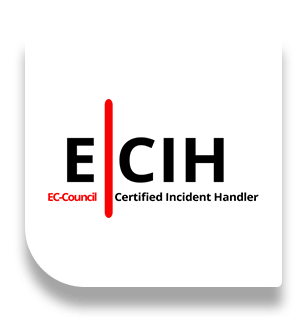 EC-Council’s Certified Incident Handler (E|CIH) is one of the most globally respected incident handling certifications. It covers how to prepare for, manage and recover from a wide range of incident threats to an organization. Aimed at the industry, E|CIH Training provides competent cybersecurity professionals. These professionals can frame and initiate an effective incident handling and response plan to counteract the after-effects of a cyberattack. It imparts such knowledge and skills to professionals that make them capable of effectively handling post-breach consequences. It also makes them capable of minimizing the financial and reputational loss to an organization arising from a breach incident.
EC-Council’s Certified Incident Handler (E|CIH) is one of the most globally respected incident handling certifications. It covers how to prepare for, manage and recover from a wide range of incident threats to an organization. Aimed at the industry, E|CIH Training provides competent cybersecurity professionals. These professionals can frame and initiate an effective incident handling and response plan to counteract the after-effects of a cyberattack. It imparts such knowledge and skills to professionals that make them capable of effectively handling post-breach consequences. It also makes them capable of minimizing the financial and reputational loss to an organization arising from a breach incident.
The E|CIH Certification is a specialist-level program providing hands-on training in real-life scenarios; it equips cybersecurity professionals with the technical know-how to systematically deal with a cyberattack incident and mitigate its impact on a business’s operations. This Certification can prove to be a gateway to rewarding career opportunities for professionals in the cybersecurity field.
The ECIH course is considered a career booster for the following kinds of professionals:
- Risk Assessment Administrators
- Cyber Forensic Investigators
- System Administrators
- System Engineers
- Incident Handlers
- Network Managers
- IT Professionals
Today’s businesses are increasingly becoming reliant on digital data to operate effectively in a dynamic business environment. As this data is coming through various digital channels, there is invariably a threat of data breach or data theft attached to it. When an incident of data breach happens with an organization, there is so much at stake. The incident needs containment in time to minimize its impact on the business’s performance. That’s where the need for an incident handling and response professional arises. If you also want to make a successful career in the cybersecurity field, you should go for an E|CIH course from Skilldacity.
The Certified Penetration Testing Professional or C|PENT is a high-level designation by EC-Council for elite penetration testers. EC-Council has introduced it as the “Ultimate Penetration Certification.” The Certification attempts to narrow the skill gaps and map the job role of a penetration tester and security analyst.
C|PENT is the first Certification to introduce hacking IoT devices that start with searching the device, gaining access, identifying firmware, extraction, and performing reverse engineering. It requires you to know how to conduct a practical penetration test in an enterprise network environment that must be attacked, exploited, evaded, and defended.
This creatively designed Certification for experienced candidates who are seasoned security professionals that want wider industry acknowledgment. It provides an in-depth analysis of the outcomes from the security tools and security testing techniques.
Those who should consider this Certification includes:
- Ethical Hackers
- Penetration Testers
- Network Server Administrators
- Firewall Administrators
- Security Testers
- System Administrators
- Risk Assessment Professionals
You get an applied as well as legal perspective of testing security architecture. Most interestingly, you learn to generate the report by processing the accumulated information retrieved from multiple pentesting frameworks. The unique scope and perspective make the C|PENT the perfect Certification for seasoned, ethical hackers who want to enhance their skills and take their careers to the next level.
Certified Threat Intelligence Analyst (C|TIA) combines cybersecurity and threat intelligence to help identify and reduce business risks and unknown threats into known threats. In addition, it allows cybersecurity professionals to increase their skills in building cyber threat intelligence. It is a comprehensive and specialist-level program.
Cyber Threat Intelligence is used to gather details of old and new threats from various sources. The threat intelligence feed, reports, and collected data will be analyzed and then generated to make security decisions for the company. There are some reasons why the organization needs a good Cyber Threat Intelligence team:
- It helps to reduce the overall cybersecurity expenses, and it also saves business capital
- It helps to lower the risks of cyberattacks from cybercriminals
- Cyber Threat Intelligence team helps other security professionals in making strategic decisions related to information security.
- It helps other security professionals to strengthen the security posture of the organization.
- It improves the efficiency of security teams in an organization
Nowadays, because of increasing Cyber Threats, the demand for Cyber Threat Intelligence Analysts is rising due to which organization is facing difficulty in choosing the best candidates.
Here are some skills that CTIA should acquire:
- Know in detail about different types of threat intelligence: A CTIA must have detailed knowledge about various threat intelligence strategies such as strategic threat intelligence, operational threat intelligence, technical threat intelligence, and tactical threat intelligence.
- Should have detailed knowledge about numerous tools and platforms: A CTIA should have in-depth knowledge about various tools and platforms used to identify cybersecurity threats
- Knowledge about numerous data collections and acquisition techniques: CTIA must have in-depth knowledge about various ways to gather data. There are multiple sources from which data is gathered, like search engines, websites footprinting, etc. With all these techniques, it is easy to collect the data.
- Knowledge of various data analysis approach: CTIA needs to have data analysis skills.
- Detailed knowledge about Threat Intelligence Tools and their applications: CTIA needs to have thorough knowledge.
- Good report writing skills: CTIA’s job is about creating working, analytical skills, and technical know-how. They should also have good report writing skills and formulate the report in a well-structured manner.
- Have hands-on experience: CTIA should have theoretical knowledge about the concepts and good hands-on experience with the skills they possess
C|TIA is an essential program for those who deal with cyber threats daily in the ever-changing threat landscape. Organizations today demand a professional-level cybersecurity threat intelligence analyst who can extract the intelligence from data by implementing various advanced strategies.
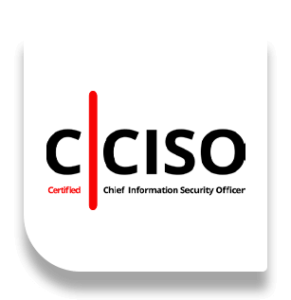 The Certified Chief Information Security Officer (C|CISO) program is the first of its kind certification that recognizes an individual’s accumulated skills in developing and executing an information security management strategy aligned with organizational goals. C|CISO equips information security leaders with the most effective toolset to defend organizations from cyber-attacks. To rise to the role of the C|CISO, strong technical knowledge, and experience are more imperative now than ever before. Still, it must be accompanied by the ability to communicate in business value. C|CISOs understand that their information security decisions directly impact their organization’s operational cost, efficiency, and agility. As organizations introduce new technologies, C|CISOs will develop and communicate a strategy to avoid the potential risks stemming from implementing the organization’s operations.
The Certified Chief Information Security Officer (C|CISO) program is the first of its kind certification that recognizes an individual’s accumulated skills in developing and executing an information security management strategy aligned with organizational goals. C|CISO equips information security leaders with the most effective toolset to defend organizations from cyber-attacks. To rise to the role of the C|CISO, strong technical knowledge, and experience are more imperative now than ever before. Still, it must be accompanied by the ability to communicate in business value. C|CISOs understand that their information security decisions directly impact their organization’s operational cost, efficiency, and agility. As organizations introduce new technologies, C|CISOs will develop and communicate a strategy to avoid the potential risks stemming from implementing the organization’s operations.
C|CISO is not a technical course but a leadership course designed specifically for experienced InfoSec professionals. The C|CISO course covers the 5 C|CISO Domains with deep dives into scenarios taken from the experience of the CISOs who contribute to building the Body of Knowledge.
The C|CISO program is for executives looking to hone their skills & learn to better align their information security programs to their goals and aspiring CISOs. In comparison, many information security management certification programs focus on middle management; the C|CISO focuses on exposing middle managers to executive-level content and encouraging existing CISOs to improve their processes & programs continually.
Achieving the CCISO Certification will differentiate you from others in the competitive ranks of senior Information Security Professionals. In addition, CCISO will provide your employers with the assurance that as a CCISO executive leader, you possess the proven knowledge and experience to plan and oversee Information Security for the entire corporation.
Needless to say that these days, most of our critical systems are interconnected and driven by computers, and in the future, the connections will be even tighter. More converted decision-making from manual to automated, we need to keep up with the changing trends. These systems’ growing complexity and connectivity will directly impact the vulnerability level and the need to protect the systems. Understanding the cyber attacking state and motive will become the central aim. The professional undertaking such a task will be more in demand and will have future-proofed careers. An EC-Council Certifications will accelerate your understanding and competencies in dealing with these threats.



